When you buy through our links, we may earn an affiliate commission.
Picking out a banjo is fun. There are so many types and the construction that goes into each banjo is unique, so you can play your favorite style.
We'll go over a lot in this article if you're a new player, and if you're an experienced player, you'll get a little refresher as you get ready to buy your new banjo. We'll discuss things like open back versus resonator and clawhammer playing versus three-finger style/Scruggs style playing.
All of these topics will help you figure out which banjo is the best for your needs. But if you're completely new, we recommend going with the Gold-Tone AC-1 It's a nice banjo under $250 for players.
It's lightweight and has a smooth fingerboard that's easy to navigate. It'll make a great entry-level banjo for learning traditional music.
We've got other great banjos on this list with different body types and more, so see which banjo is the best pick for you.
Quick Summary of the Best Banjos
- Gold Tone AC-1 (Best Open Back Banjo for Banjo Beginners)
- Deering Goodtime Americana Left Handed 5 String Banjo 12 In. Rim (Best for Lefties)
- Washburn B9-WSH-A Americana 5-String Resonator Banjo (Best Washburn Banjo)
- Epiphone MB-100 First Pick Banjo Natural (Best Affordable Beginner Epiphone Banjo)
- Recording King Madison Maple RK-R35 (Best for Seasoned Players)
Best Banjos
1. Best Open Back Banjo for Banjo Beginners – Gold Tone AC-1
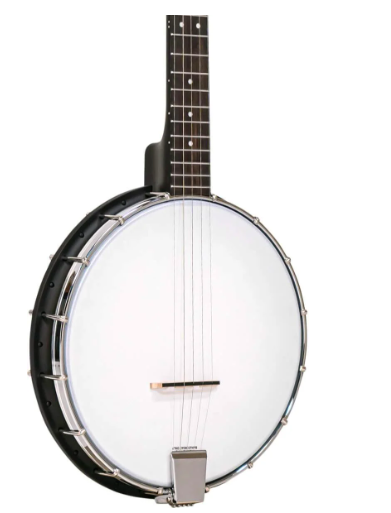
SPECS
- Body Type: Open-back
- Fingerboard Material: Rosewood
- String Number: 5
When shopping for starter banjos, it's best to go for something affordable, easy to play, and versatile. Gold Tone, one of the best in the banjo game, has a nice entry-level banjo that's durable and easy to play. When we say easy to play, we're talking about playability.
We like that the neck profile is comfy and low action, so beginners can fret notes and play chords without too much frustration.
With a slim neck, younger players can enjoy learning too so teens or players with smaller frames won't struggle to navigate the fingerboard. And yes it's a rosewood fingerboard, which is known for being one of the easiest to navigate.
Overall, this banjo is built for new players to be able to work up their banjo skills for more intricate playing. The Gold Tone banjo is best suited for clawhammer or frailing, but it's still great for exploring other styles as you progress.
2. Best for Left-Handed Players – Deering Goodtime Americana Left Handed 5 String Banjo 12 In. Rim
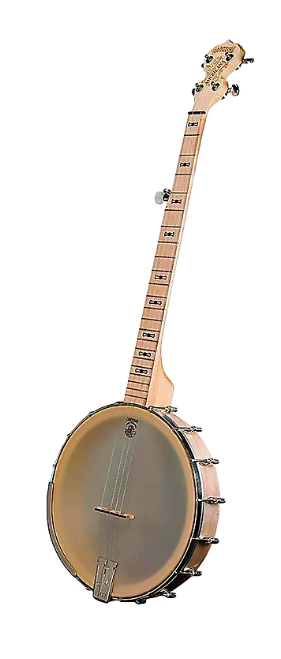
SPECS
- Body Type: Open-back
- Fingerboard Material: Maple
- String Number: 5
We made sure to include a great pick for lefties -- this banjo will be comfy and easy to play. We also wanted to make sure Deering had a spot on this list. Deering is a well-known banjo brand, and makes some of the best banjos on the market!
Their Goodtime Series is top-tier, and this model is versatile, making it suitable for traditional, folk, bluegrass, country, and more. It has a 12-inch rim that contributes to its impressive volume and projection. It also has a nice warm tone.
The Deering Goodtime banjo is under $700, making it an affordable banjo of this quality. The banjo is well-crafted and will be a banjo you'll use for plenty of years. It'll make a great starter banjo but will also be as useful when you advance as a player.
3. Best Washburn Banjo – Washburn B9-WSH-A Americana 5-String Resonator Banjo
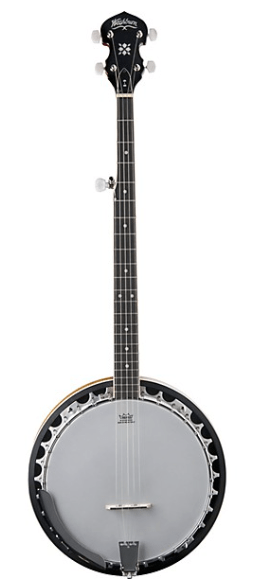
SPECS
- Body Type: Resonator
- Fingerboard Material: Rosewood
- String Number: 5
Washburn banjos is another American brand loved by banjo players. Their construction and detail are top-quality, we're big fans of them!
They have a nice banjo made for a variety of banjo playing banjos ranging from beginner to advanced players, along with many playing styles, including bluegrass, folk, country, and more.
The resonator helps the banjo cut through the mix for a strong sound, so if you're looking for a banjo with lots of volume and projection, this is an excellent pick.
The banjo is pretty affordable, too. It's under $400! A banjo at this price and quality from a reputable brand is a steal. Overall, it's a fantastic banjo that's smooth and easy to play. We love the rosewood fingerboard, and so will you for easy fretting.
4. Best Affordable Epiphone Banjo for Beginners – Epiphone MB-100 First Pick Banjo Natural
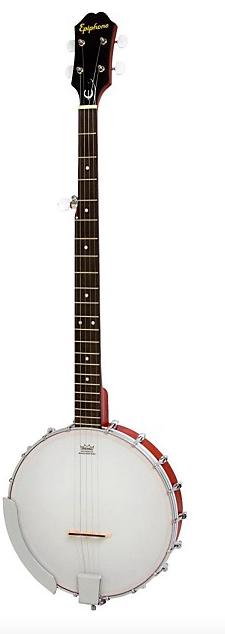
SPECS
- Body Type: Open-back
- Fingerboard Material: Rosewood
- String Number: 5
If you love Gibson acoustic guitars then you definitely like Epiphone as well! Epiphone has quality banjos for everyone, but this is arguably the best banjo for beginners. Seasoned players who want a cheaper banjo for travel or practice on the go will also like it.
This banjo has a super comfortable neck shape and low-string action for beginners. The rosewood fingerboard will be your favorite feature.
The banjo is pretty versatile, so you can play just about all of your favorite tunes on it, ranging from bluegrass, folk, and more.
The Epiphone MB-100 Banjo is one of the best in this price range: not only does it sound great but it looks nice as well. We love the chrome hardware, and we're glad that even at this low price Epiphone didn't sacrifice the visual appeal.
5. Best for Seasoned Players – Recording King Madison Maple RK-R35
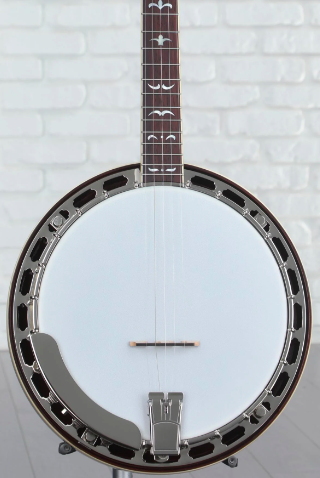
SPECS
- Body Type: Resonator
- Fingerboard Material: Padauk
- String Number: 5
We wanted to include a nice five string banjo for some seasoned players. This banjo comes from Recording King, one of the best brands known for high-quality banjo craftmanship.
This Recording King resonator banjo is super popular for touring, recording, and practice of course. The versatile banjo is a favorite among pro or seasoned players who play various styles, ranging from bluegrass to country, and folk music. Basically, anywhere a resonator may be best.
The tone and projection of this Recording King banjo are amazing -- the maple construction adds a bright and punchy sound and the tone ring enhances the volume, which players love when recording and performing.
The resonator banjo is comfortable to play, which we value in every banjo regardless of what your skill level may be. The banjo has a padauk fingerboard, which is smooth for effortless fretting.
Overall, this will be a nice banjo to invest in one day. While it's still a professional-level banjo, it's still affordable compared to many high-end banjos out there.
Best Banjo Buyer's Guide
There are various types of banjos to consider, along with features that make banjos sound very different from each other. Below, we'll go over the different types of banjos you'll find and will delve into the world of banjo playing styles and more.
Banjo Type
Open-back banjos have an open wooden back without a resonator. They are great for traditional folk, old-time, and clawhammer/frailing styles of playing. They produce a mellower, softer tone and are favored for their warm, woody sound. They are awesome for beginners!
Resonator banjos feature a metal plate attached to the back of the banjo, known as the resonator. The resonator enhances the volume and projection of the instrument, making it best for bluegrass, country, and more modern styles. The tone is brighter than open-back banjos and is popular among Scruggs-style players (finger-picking).
Tenor banjos are traditionally tuned in fifths (C-G-D-A) and have a shorter scale length and a smaller body compared to other banjos. They are used in traditional jazz and Irish music. They have a bright, crisp sound that is suitable for fast-paced melodies.
Plectrum banjos are similar to tenor banjos in terms of size and scale length but are typically tuned in a lower, open tuning (C-G-B-D). They have four strings and are played with a plectrum instead of fingerpicking.
Five-string banjos consist of four short strings and a fifth drone string, called the "fifth string." The fifth string is shorter and usually runs through the neck, terminating at the fifth fret. They are the most versatile banjo, and you can use them for traditional and contemporary styles.
Electric banjos are designed for amplified performances. They typically have a solid body, and magnetic pickups, and can be connected to an amplifier or sound system. They're great for rock, jazz, and fusion.
Playing Style
Think about your favorite playing style, as this will play a huge role. There are 2 playing styles: clawhammer/frailing and three-finger/Scruggs style. What's your favorite?
If you're not sure, you'll likely lean towards clawhammer if you prefer traditional folk and old-time music. You may prefer 3-finger picking if you play bluegrass music.
Resonator Material
Common materials used for the resonator are wood, metal, or synthetic materials. Wood is warm and provides depth, metal provides a bright sound, and synthetic (usually plastic) have a brighter and more focused attack, definitely not replicating the warmth of a wood resonator.
Tone Ring
Different types -- brass, bronze, and steel produce different tonal qualities. A mastertone-style tone ring is great for bluegrass (usually bronze or bass).
A tubaphone-style tone ring is warm and mellow (great for clawhammer style music), and a flathead tone ring is made of bell-bronze or brass and has a bright, focused sound with lots of projection. A popular pick for bluegrass music.
A white laydie tone ring has a balanced, warm, and sweet tone with good clarity. It's great for clawhammer style music.
Neck and Fingerboard
Like your guitars, the neck needs to be comfortable to play. Consider the neck profile and scale length, along with the fingerboard material.
The tone of rosewood is warm, rich, and balanced, it feels smooth and players find it easy to navigate across.
Ebony has a bright and articulate tone, and their fingerboards have a smooth and dense surface that is slick. It's also comfortable and allows for fast playing.
Head Type
Head material plays a huge role, many banjo heads are plastic or made of animal skin. Synthetic heads have a bright and crisp sound and animal skin has a warmer and traditional tone.
Frequently Asked Questions (FAQs)
Which banjo is best for my music style?
Traditional music: open-back and five-string.
Irish & jazz: tenor.
Bluegrass & contemporary: resonator, 5-string, and electric.
What do I look out for in terms of playbaility & construction?
String height, neck profile, fretwork, and overall build quality. Make sure it comes from a reputable brand known for building quality banjos that last long. Also, pay attention to hardware and make sure they are well-made.
What are the best banjo brands?
Gibson, Deering, Gold Tone, Nechville, and Recording King are a few. They have plenty of banjo models for beginners and professionals.
What is the ideal budget for a banjo?
Cost will depend on brand and model, along with features. You might spend more on an electric compared to a beginner acoustic banjo. Budget for at least $500 on your first banjo.
Verdict
Beginner banjos can get pricey, but we made sure to find high-quality instruments that wouldn't break the bank. Cheaper banjos can be $400+, but we managed to find a nice high-quality instrument under $250. It comes from one of the best banjo brands, Gold Tone.
The Gold Tone AC-1 is perfect for the beginner banjo player. The beginner banjo is a great open-back banjo that's lightweight. New players can navigate it easily and learn some basic banjo skills and of course dive into learning traditional tunes.
If you're into playing everything, and you've been playing for a while, the Recording King R35 is best. It's one of the best out of professional banjos at this price point, it's loud, smooth, and overall great for studio recording and live gigs.
Photo Courtesy Sweetwater

